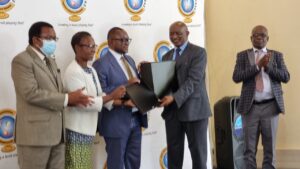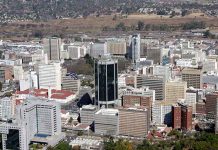
Itai Ndongwe
President Emmerson Mnangagwa’s mantra of leaving no one and no place behind is bearing fruit, as the Postal and Telecommunications Regulatory Authority of Zimbabwe (POTRAZ) and its partner, the Ministry of ICT Postal And Courier Services, are establishing digital infrastructure to bridge the digital divide.
With the world now in the digital age, new technologies play a significant role in improving the country’s economy while also removing development barriers and depriving poor people’s rights to development while widening the urban-rural digital divide.
As of 2022, 1117 schools had been connected to the Internet through the Schools Connectivity Programme, and an additional 672 schools and 17 institutions of Higher and Tertiary Learning, including Polytechnics and Vocational Training Centres, had been provided with 12 months of bandwidth through the ICTs for Disaster Management program, in order to mitigate the impact of COVID -19.

Potraz equipped 186 computer laboratories at various schools across the country with a minimum of 30 computers each as part of the School Computer Laboratories program. During the school year, a total of 4280 computers were distributed to schools.
The regulator, in collaboration with the Ministry of ICT, began the year 2023 by commissioning fourteen (14) School Computer Labs in Masvingo Province. This entails ensuring that connectivity services will be available throughout the country.
The schools include Kanongovere Secondary, Chikwerengwe Secondary, Rafamoyo High, Mushayavanhu Primary, Mutero Central Primary, Magombedze High, Chimombe Mudyanadzo High, Mutambwi High, Rumhizha High, Mutendi High, Zimuto High, Chinyanganya Primary, Mavhiringidze Secondary, and Nerupiri Secondary schools.
Potraz is utilizing universal services funds for projects aimed at closing the digital divide in the country, as the program aligns with the second republic’s push to leave no one behind as it rallies to transform the country into an upper-middle-class economy by 2030.
Potraz Director General Dr. Gift Machengete stated at the program’s official launch last week at Mutendi High School in Masvingo that it was high time the country moved along with the demands of the fourth industrial revolution, which necessitates the embrace and spread of broadband services in the country.
He assured the nation that they will continue accelerating the program as he declared that the year 2023 will be a year of acceleration in ICT.
“We shall certainly continue on the same trajectory as we accelerate the ICT Lab per school program as we move in haste to reach all corners of the country,” said Machengeta
The Minister of ICT Jenfan Mwesere said the world has come to the realization of the pivotal role that ICTs and the digital economy drive to connect all the people of the world virtually.
“It is now critical to bridge the digital divide for the 2.9 billion people who still remain offline worldwide, more so the millions not connected in our beloved nation of Zimbabwe. Indeed, the call for universal access has never been more profoundly sensed than during the trying times we found ourselves in, due to the COVID-19 Pandemic”
“It is against this background that, as Government, we remain resolute in our quest to attain a digital economy and knowledge society, a society where all our citizens have access to ICTs, regardless of their geographical, social, or economic status. To that end, we continue to provide an enabling environment for the growth of the ICTs sector, by deploying critical ICTs infrastructure like schools’ ICTs laboratories in our rural communities and districts across Zimbabwe,” Muswere said.
As the usage gap becomes a more salient aspect of Africa’s digital divide, policy action needs to address affordability barriers for both devices and data and to provide policy imperatives that will expand access to mobile phones and data.
Potraz, in collaboration with the Ministry, is working on the first three (3) stages of the digital divide, which are accessible to the internet and digital connectivity for all Zimbabweans, including rural and low-income communities. And a number of initiatives aimed at increasing the digital footprint in rural communities are being launched.
According to the National Development Strategy 1 (NDS), the country intends to have internet access at the village level by 2030 by extending the fiber optic backbone and providing last-mile connectivity.
In this regard, the government intends to increase internet penetration from 59.1% in 2020 to 75.4% by 2025, while mobile penetration is expected to reach 100% by 2025 during the tenure of the NDS1.
Indeed, as the world enters the digital age, this year will be a year of acceleration in the ICT sector.
With the 2030 deadline for meeting the Sustainable Development Goals looming, identifying new strategies to achieve full digital inclusion has become a matter of utmost urgency, as Potraz and the Ministry of ICT equip the nation with mobile technologies in order to have any hope of meeting Global Goals.
According to the International Telecommunication Union’s Measuring Digital Development Facts and Figures for 2022, the world has welcomed its 8 billion inhabitants, and an estimated 5.3 billion people – roughly 66% of the global population – use the Internet. Despite this, approximately 2.7 billion people worldwide remain completely offline, with universal connectivity remaining a distant prospect in the least developed countries and landlocked developing countries, where only 36% of the population is online on average.
Young people remain the driving force of connectivity globally, with 75 percent of the 15- to 24-year-old age group now online, compared with 65 percent for the rest of the world’s population.
It goes on to say that it means working more collaboratively to close chronic gaps in rural access, access at home and at school, digital skills training, connection quality and speed, and equal digital opportunities for marginalized groups like women and girls, as well as striving to ensure that every country meets the Broadband Commission for Sustainable Development’s affordability target of less than 2% of monthly gross national income per capita.
According to Masvingo Provincial Education Director, Shyllate Mhike, the education ministry has welcomed the developments that connect rural students with the global village.
“Potraz has given us 30 laptops with paid 12-month wifi subscriptions for connectivity, and they say they are going forward with the program. This means that our students will learn on computers and be able to search the internet for the information they seek. We are part of the global village; our students will not be left behind,” she said.
Power continues to be a significant challenge that affects digital participation but some schools have resorted to the use of Solar energy and generator to control they’re to participate in the digital space.
“We have spoken with the Director General as we had problems with electricity as our transformer is burnt and the DG said he will deliver the message to ZESA but as of now, we have collaborated with parents as a school. We were able to purchase a generator, which will allow our students to recharge their laptops and continue their studies. We were able to purchase one (1) solar panel so that the student’s studies would not be disrupted by power outages,” Ellen Matauruse headmistress
The villagers have praised the authorities for their efforts in providing laptop computers to schools in an effort to bridge the urban-rural digital divide.
Masvingo Province State Minister, Ezra Chadzamira expressed gratitude over the recognition of his province in the allocation of resources.
“Masvingo province is grateful to his Excellency President Mnangagwa through the Ministry of ICT and Courier Services for its initiatives which are focusing on reducing the digital divide across the country and accelerating the attainment of a digital economy by 2030,” Chadzamira said.
Of course, there are some schools that are yet to be equipped but Potraz has guaranteed the nation that they shall leave no place and no one behind in this program.
Apart from the e-learning initiatives, Potraz in 2022 connected a total of 955 health centers were connected to the internet with a one-year bandwidth subscription being paid for each of the centers. Additionally, A total of 249 Police Stations were connected to the
Internet under the E-Government Programme, 160 computers were disbursed to the Ministry of Public Service, Labour, and Social Welfare under the same program as we accelerate the program this year.
Last year we also constructed 32 new Community Information Centres which are at various stages of completion. In addition to that, we also started the Construction of an ICT vocational training centre at Marondera Open Female Prison to ensure inmates are not left behind in the digital economy.
In a bid to connect the unconnected, last year POTRAZ funded the relocation of 66 co-located towers by the three mobile operators, Econet, NetOne, and Telecel. The Projects are at various stages of completion.











